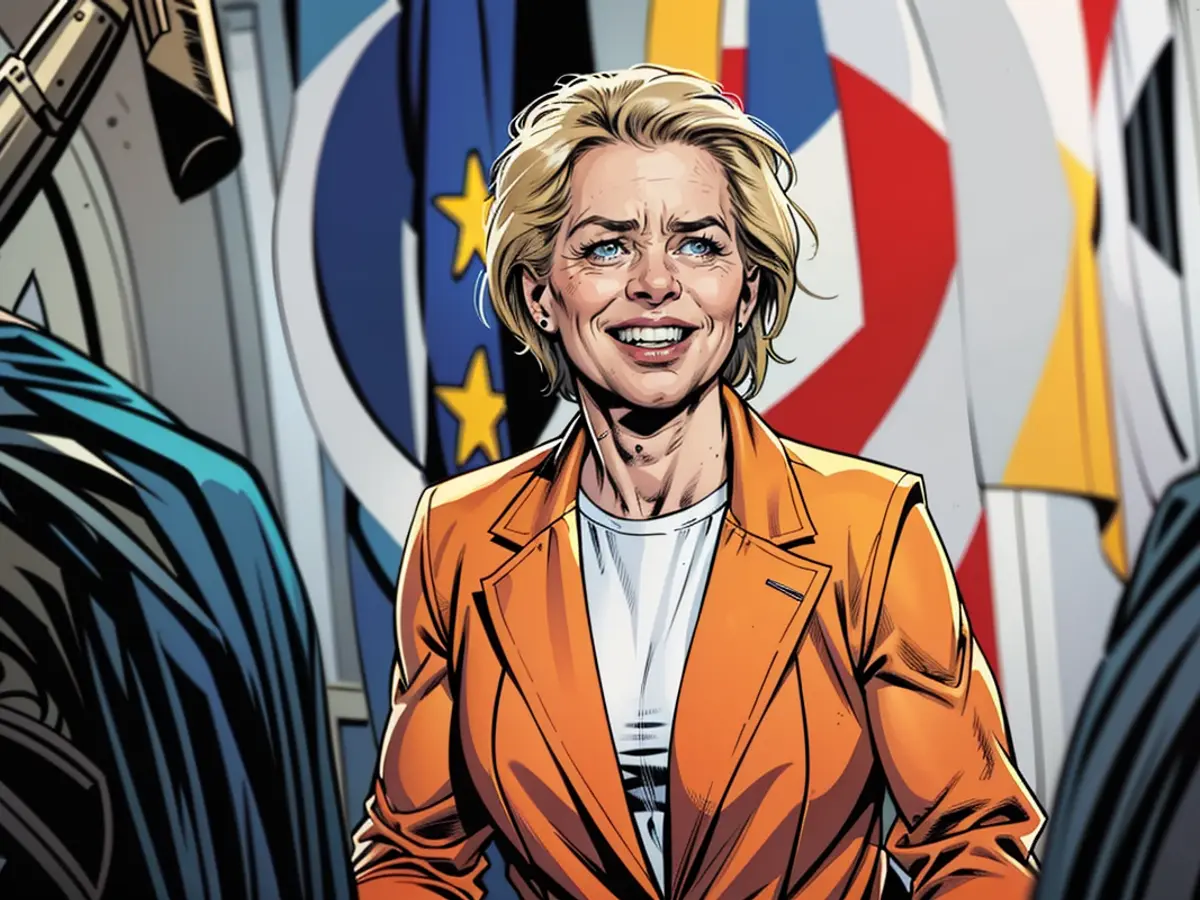CDU politician - Ursula Von der Leyen nominated for second term as EU Commission President
The European Council has nominated Ursula von der Leyen, a CDU politician, for a second term as President of the EU Commission. In addition, the former Portuguese Prime Minister António Costa was nominated as the next President of the European Council, and the Estonian Prime Minister Kaja Kallas was proposed to become the new EU High Representative. Several delegations announced this at the EU summit in Brussels on Thursday.
Due to an agreement among the major European party families in the middle of the week, it was already almost certain before the summit began that the top positions would go to von der Leyen, the Social Democrats' Costa, and the Liberal Kallas.
The presidency of the EU Commission is considered the most important position to be filled after the European elections. The president or president-elect is responsible for managing approximately 32,000 employees, who propose new EU laws and oversee the enforcement of European treaties. In addition, the Commission president sits at almost all major international summit tables as the EU representative.
European Election Results Served as Basis
The basis for the personnel package is the result of the European elections about two weeks ago. The Center-Right European People's Party (EVP), with Ursula von der Leyen as their Spitzenkandidatin, achieved the best result. She will now form an informal coalition with the second-placed party families of the Social Democrats (S&D) and the Liberals (Renew) in the parliament.
For the EVP – which includes the CDU and CSU – the negotiations were led by Polish Prime Minister Donald Tusk and Greek Prime Minister Kyriakos Mitsotakis, for the Social Democrats by German Chancellor Olaf Scholz and Spanish Prime Minister Pedro Sánchez, and for the Liberals by French President Emmanuel Macron and the outgoing Dutch Prime Minister Mark Rutte.
Italian Prime Minister Angered by Process
The Italian Prime Minister Giorgia Meloni was particularly angered by the process. She criticized the fact that, despite the good results of her Fratelli d'Italia (Brothers of Italy) party in the European elections, she was not directly involved in the discussions about the personnel package. Hungarian Prime Minister Viktor Orbán also voiced his displeasure with the procedure.
However, their approval was not necessary, as no unanimity was required. At least 20 EU countries had to agree, representing a minimum of 65% of the EU population.
At the summit on Thursday, several prime ministers tried to calm the waters and declared that it had not been about excluding anyone. Polish Prime Minister Donald Tusk, for example, said: "There is no Europe without Italy, and there is no decision without Prime Minister Meloni. That's clear to me."
Von der Leyen Needs Parliamentary Majority
For Ursula von der Leyen to begin a second term, she now needs to secure a majority in the parliament. The informal coalition of EVP, Social Democrats, and Liberals theoretically has a comfortable majority of about 400 of the 720 votes. However, it is considered likely that a certain number of parliamentarians may deviate from their faction's line and not give their vote to the Germans.
Therefore, Commission President von der Leyen is currently also making efforts to secure the votes of MPs from other parties, particularly those of the Greens. Representatives of the party have recently signaled openness for talks.
The vote in the Parliament in Strasbourg could already be scheduled in the third week of July, according to Parliament President Roberta Metsola's statements.
- Ursula von der Leyen, the CDU politician, was nominated for a second term as President of the EU Commission at the EU summit in Brussels.
- The European elections about two weeks prior to the summit served as the basis for the personnel package, with the Center-Right European People's Party (EVP) achieving the best result.
- António Costa, the former Portuguese Prime Minister, was nominated as the next President of the European Council, and Kaja Kallas, the Estonian Prime Minister, was proposed to become the new EU High Representative.
- The presidency of the EU Commission is a significant position, with the president responsible for managing over 32,000 employees and representing the EU at major international summits.
- Giorgia Meloni, the Italian Prime Minister, was particularly angered by the process, critiquing her exclusion from the discussions about the personnel package despite her party's good results in the European elections.
- Donald Tusk, the Polish Prime Minister, and several other leaders attempted to calm the waters at the summit, emphasizing that no one was being excluded from the decision-making process.
- Ursula von der Leyen needs to secure a majority in the parliament to begin a second term as Commission President, with the informal coalition of EVP, Social Democrats, and Liberals having a theoretical majority of about 400 votes.
- Representatives of the Greens have signaled openness for talks with Commission President von der Leyen, as she seeks to secure votes from parliamentarians outside of her faction's line for her second term.









